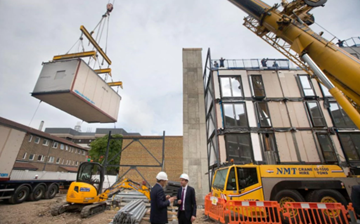Publications

Suzané van Schalkwyk
6th Apr, 2021
Modular construction is a process in which buildings are constructed off-site using the same materials and designing to the same standards as conventionally built facilities – in about half the time. These buildings are produced in “modules” and once assembled, are virtually indistinguishable from their site-built counterparts.
Two types of modular construction
Modular buildings can be constructed to be either permanent or relocatable.
Permanent Modular Construction (PMC) is an innovative, sustainable construction method utilizing off-site, lean manufacturing techniques to prefabricate single or multi-story whole building solutions in deliverable module sections. PMC modules can be combined with site-built projects or stand alone and can be delivered with MEP (mechanical, electrical, and plumbing), fixtures, and interior finishes.
Relocatable modular buildings are partially or completely assembled buildings that are designed to be reused or repurposed multiple times and transported to different building sites. These buildings offer fast delivery, ease of relocation, low-cost reconfiguration, accelerated depreciation schedules and enormous flexibility.

Some benefits of modular construction
Modular buildings are greener, faster, and smarter!
The factory-controlled process generates less waste, creates fewer site disturbances, and allows for tighter construction. This type of construction leads to greater flexibility and reuse as modular buildings can be disassembled, and the modules relocated or refurbished for new use, reducing the demand for raw materials. This process also eliminates waste by recycling materials, controlling inventory, and protecting building materials.
The construction of modular buildings occurs simultaneously with site work, which according to research allows projects to be completed 30% to 50% sooner than traditional construction projects.
Buildings are also occupied sooner, leading to a faster return on investment.
Along with the above mentioned, modular construction eliminates the need for storage of materials and high labour costs, as they are not constructed on site.

The challenges of modular construction
Modular construction sounds progressive and remarkably advantageous but, as with any other construction method, and seen within our practice, there are some real challenges that can affect the success of these buildings.
The modular approach on scale is better the more uniform and repetitive the spaces and products are. So naturally, apartment buildings and hotels are likely candidates if each unit can be standardized and stacked. At this stage, pending advancements of the existing technology, trying to create distinct or non-repetitive modules reduces, and potentially defeats, the time and cost advantages for both buyer and supplier parties.
Modular construction demands that more decisions and greater design and engineering be completed up front in the process. It requires architects, engineers, and contractors to be familiar with the intricacies of the modular fabrication and erection stages.

This type of construction also involves a transportation risk, since the modules are prefabricated in a factory, which can be vast distances from the job site, it needs to be transported either directly to the site or staged at a place nearby and then set in place. This could potentially hold up an entire sequence of installation.
Should you build modular?
According to research, modular buildings are generally stronger than site-built construction because each module is engineered to independently withstand the rigors of transportation and craning onto foundations. Building off-site can also ensure better construction quality management as manufacturing plants have harsh quality control programs that promote superior quality of construction every step of the way.
Building in a controlled environment reduces waste through avoidance upstream rather than diversion downstream. This, along with improved quality management throughout the construction process and significantly less on-site activity or disturbance, naturally promotes sustainability.
Although these buildings are said to be of high quality, sustainable, innovative, efficient, and have reduced timeframes, we at AGORA Quantity Surveyors have found that the challenges remain within the design, costing, and transportation of these buildings.
When considering the said advantages of modular construction, one should expect that these buildings would be less expensive than conventional buildings, yet a like-for-like cost comparison on various projects proved that conventional building methods on low rise buildings remains the more cost-effective way to build.
We have also found that even though site time gets reduced the cost and time associated with factory assembling remains more expensive than conventional ‘in-situ’ construction methods. These building are also limited in design and carry extremely high transportation costs.
With the above said, I believe that modular construction, with some advancement, could be an efficient construction process that is poised to help the construction industry grow!
EARLIER POSTS